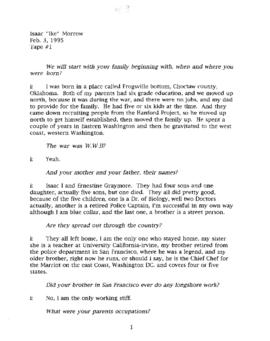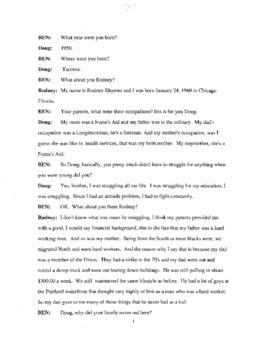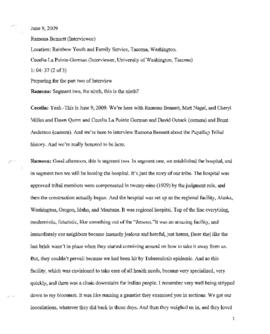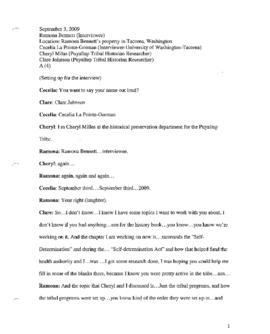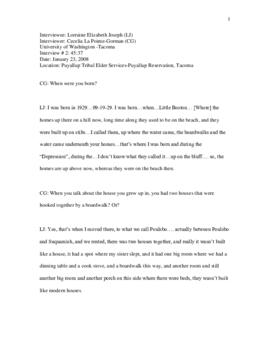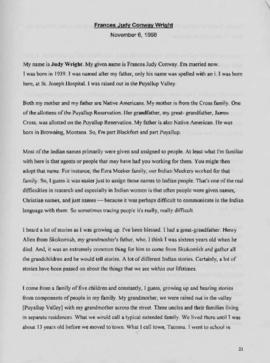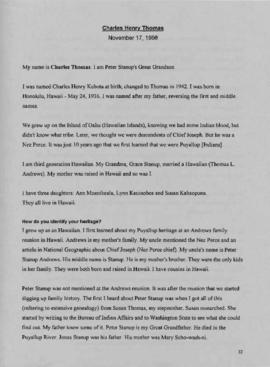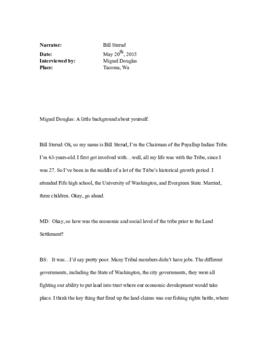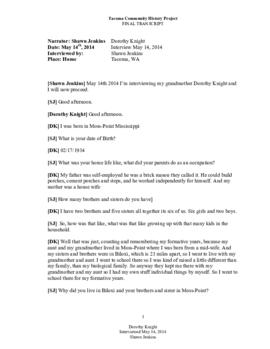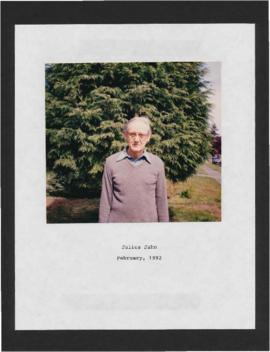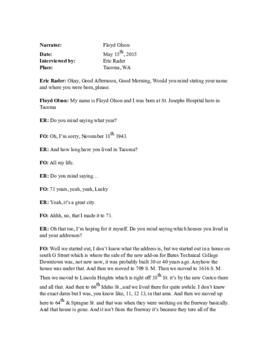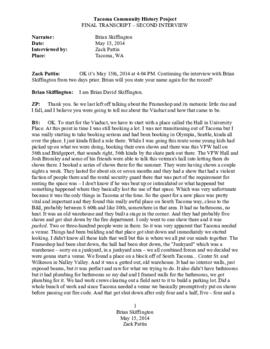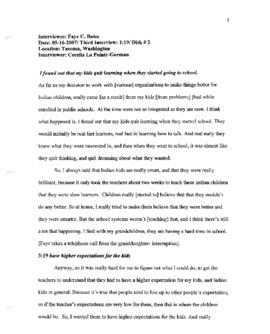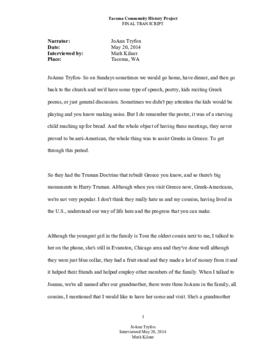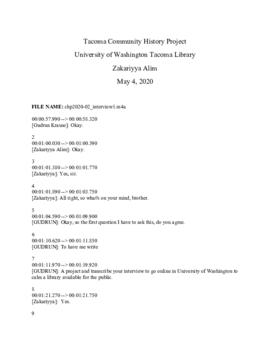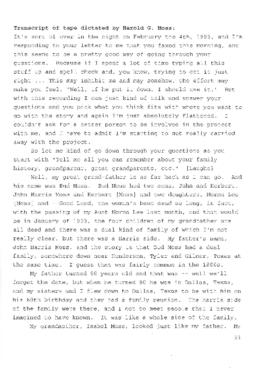Showing 230 results
Collections153 results with digital objects Show results with digital objects
Peter C. Stanup: A Leader Among the Generous People
- File
- 1998
Oral history interviews with Lena Landry, Judy Wright, and Charles Thomas by Darlyne Reiter conducted 11/1998. Puyallup Tribal Elder Lena Landry and Puyallup Tribal Historian Judy Wright discuss the plight of Pacific Northwest Native Americans during the late nineteenth and early twentieth centuries and reflect on the life of Peter Stanup, a Puyallup tribal leader and activist whose 1893 death remains a source of enduring controversy. Charles Thomas, Peter Stanup's great-grandson, also shares his family's quest to uncover their history and their discovery of their connection to Stanup.
The Puyallup Land Claims Settlement: A Lesson in Struggle
- Item
- 2015
Oral history interview with Bill Sterud by Miguel Douglas conducted 05/20/2015. Examining the social, economical, and communal effects of the Puyallup Land Claims Settlement of 1990, this research essay explores these various elements through the assistance of an interview conducted with the current Puyallup Tribal Chairman, Bill Sterud. Sterud was also the Puyallup Tribal Chairman at the time of that the settlement took place, providing a vivid recollection of the Tribal community before and after the settlement and how the settlement changed the course of the Puyallup Tribe of Indians forever. This research essay also explores several of the major issues found within the non-Indian community surrounding the land claims settlement as well.
- Series
Mid-Knight Run: The Story of One Family's Journey to the Northwest from the Deep South
- Item
- 2014
Oral history interview with Dorothy Knight by Shawn Jenkins conducted 05/14/2014. Dorothy Knight recounts her family's journey from Moss Point, Mississippi, to Tacoma, Washington, and compares and contrasts life in the Northwest and the Deep South. The interview focuses in particular on the interplay between region and racism within the United States.
- Item
- 2015
Oral history interview with Floyd Olson by Eric Rader conducted 05/15/2015. The purpose of this oral history was to interview Floyd Olson in order to capture his perspective and memories as they pertain to the South Tacoma Business District and how it was transformed due to the construction of I-5 and the Tacoma Mall. Mr. Olson is a lifelong South Tacoma resident and has vivid memories of the time both before and after I-5 and the Mall. As of yet the Tacoma Community History Project has no oral history pertaining to South Tacoma; thus it is an aim of this project to resolve that omission. The methodology used was a personal interview with Mr. Olson using pre-conceived, open-ended questions based on prior research. The interview was conducted in such a manner so as to be as respectful to Mr. Olson while at the same time keeping the focus of the interview on the changes and history of South Tacoma. The results of the interview show that indeed prior to I-5 and the Mall the South Tacoma Business District was a thriving, wholesome area that catered to the everyday needs of the surrounding residents. However, the completions of I-5 and the Mall undoubtedly altered the atmosphere of the area; Mr. Olson can attest to these changes. The implications of this oral history are in laying the foundation for future studies on South Tacoma.
- Series
The Tacoma Rescue Mission: Hope for the Homeless
- File
- 1991
Oral history interviews with Joseph N. Ellis and Diana K. Jeffrey by Patti R. Saunders conducted 05/07/1991. The oral history interview transcript contains interviews with Joe Ellis, Executive Director of the Tacoma Rescue Mission and Diana K. Jeffery, Administrative Assistant at the Mission. Ellis gives a brief background on his life and training, as well as an overview of the history of the Tacoma Rescue Mission, including some discussion of the work and character of the superintendents who preceded him (C. M. Shaughnessy, Ray L. Marvin and G. Hanley Barker). Ellis describes the programs and services provided by the Tacoma Rescue Mission in some detail. Jeffery recounts her ten years of service with the Mission, where she started as the manager of the emergency family shelter. She describes her direct work with the clients and refers to some individuals who apparently were present at the time her interview was recorded. In addition to those for Ellis and Jeffery, release forms are included for five participants from the ""New Life"" program who also were interviewed, as well as another Mission staff member, but these interviews are not contained in the transcript.
- File
- 1994
Oral history interviews with Joseph Schibig, Katy Schibig, and Joseph Marty by Pamela M. Hailey conducted January-February 1994. Joseph and Katy Schibig and Joseph Marty describe their experiences as Swiss immigrants to Tacoma and reflect on the legacy of the citys close-knit Swiss community. Areas of focus include the Tacoma Swiss Society and the Swiss Hall and Tavern, which Marty managed from 1952 to 1963.
Blood, Sweat, and Tears: Nhung and Thanh Huynh's Oral History
- File
- 2015
Oral history interviews with Nhung Huynh and Thanh Huynh by Jennifer Nguyen conducted 05/12/2015, 05/20/2015. In 1973 the war in Vietnam had ended for the United States and by 1975 the Vietnam War had effectively ended altogether. Following the end Vietnam War, the life of the South Vietnamese people would be disrupted and the new regime in Vietnam would implement harsh new laws and regulations against the South Vietnamese population to stabilize the new government. The chaos towards the end of the Vietnam War led to the United States to accept large numbers of Vietnamese refugees into the country. Did the United States do enough to help the refugees, or did their concerns go unheard? The purpose of this oral history project is to gain thoughtful information about the perspectives of Vietnamese refugees and their trials and tribulations during their voyage to freedom and once they arrived to America. This oral history project includes personal stories of Nhung Huynh and Thanh Huynh's refugees escaping on boat and their lives while waiting to resettle in America.
- Series
Women and Tacomas Civil Rights Movement: Mrs. Bil Moss
- File
- 2009
Oral history interview with Bil Moss by Kristina L. Walker conducted April - May 2009. Community leader Bil Moss looks back at six decades of social activism and discusses her involvement in Tacomas civil rights movement. She describes her early work to secure open housing in Tacoma, which arose from her personal struggles to purchase property outside the Hilltop area, and her work with the Tacoma Chapter of the Links on the Sickle Cell Project. Moss touches on a number of her civic and political activities in these three lengthy interviews and shares some insights into the social barriers she has faced as an African-American woman.
- Series
Tacoma Judaism: One Hundred Years
- File
- 1992
Oral history interviews with members of the Jewish community, Rabbi Richard Rosenthal, Steph Farber, and Lucille Hurst by Nardah L. Fox conducted February-May 1992. The interviews with three members of Tacoma's Jewish community, Richard Rosenthal, Steph Farber, and Ruth Hurst, to some degree all touch upon the exodus of businesses (many of them Jewish-owned) from the downtown Tacoma business district. In two interview segments, Rabbi Rosenthal discusses early Jewish settlement in Tacoma, the 1960 merger of existing Conservative and Reform congregations to form Temple Beth El, and adds some details about his early life and training. Farber recounts his beliefs about misguided urban renewal practices of the 1960s and 1970s and reminisces about the many businesses that once flourished in downtown Tacoma. The transcript of the interview with Hurst appears to provide only an excerpt; she discusses her family business, Feist & Bachrach, as well as other downtown Tacoma stores operating prior to 1965.
From Tules to Tiaras: A History of the Masonic Temple Building and Temple Theater
- File
- 1992
Oral history interview with Will J. Conner by Barbara A. Smith conducted 02/09/1992. Will James Conner talks about his fifty years in the theater management business and shares some of the history of the Temple Theatre, which he ran from 1932 to 1975. Reflecting back on hundreds of stage shows, music productions, and motion pictures, Conner provides some insight into the changing face of entertainment and entertainment technology before, during, and after World War II. In addition to the Temple, Conner also managed a number of other Tacoma theaters, including the Blue Mouse, the Music Box, the Rialto, and the Roxy (now the Pantages), and he touches upon each of these during this lengthy, in-depth interview.
- Series
